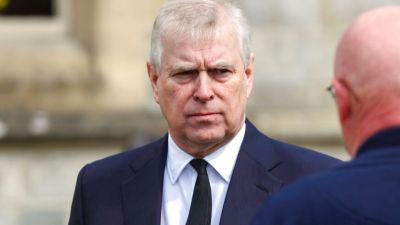Prince Andrew can still deputise for Queen, despite being stripped of royal patronages

Prince Andrew is still able to stand in for the Queen as Head of State should she be taken ill, despite being stripped of his royal duties and military titles last week.
He is one of four Counsellors of State who can be appointed on a temporary basis to act on behalf of the monarch.
Even though Buckingham Palace announced Prince Andrew would defend his legal case as a “private citizen” and would not return to his royal duties, sources at the palace insist there is little they can do about his position as a Counsellor of State.
By law, those who can deputise for the monarch include his or her spouse plus the next four people in the line of succession who are over 21 years old.
The Duke of York is ninth in line to the throne – but counting only those who are 21 or older – it means Andrew remains eligible.
Without the Queen’s husband Prince Philip, the four remaining Counsellors of State are Prince Charles, Princes William, Prince Harry and Prince Andrew.
William and Kate’s three children and Harry and Meghan’s two children are excluded on account of their age.
Royal aides admit that there would have to be a change in the law in order to remove Prince Andrew from this role.
As a Counsellor of State, Prince Andrew would be authorised to carry out most of the official duties of the monarch – which include attending Privy Council meetings, signing certain documents and receiving new ambassadors to the UK.
Duties which cannot be delegated include the dissolution of Parliament, except on the Queen’s "express instruction", appointing a Prime Minister, and creating new peers.
The law was created by the Regency Act in 1937, to manage an absence or incapacitation of the Sovereign without having to transition to a full Regency.
Listen to ITV News' podcast - The Royal Rota
The last regency period in Britain was from 1811 to 1820 when George, Prince of Wales, stood in as Regent – acting for his father King George III who was incapacitated by mental illness (often referred to as ‘Mad King George’).
The Prince Regent became King George IV upon the death of his father in 1820.
Confirmation of Prince Andrew’s role as Counsellor of State is confirmed on the official Royal Family website where it states: “The current Counsellors of State are The Prince of Wales, The Duke of Cambridge, The Duke of Sussex and The Duke of York.”
Last week, the Queen removed all the duties, military titles and patronages she had bestowed on her second son.
It followed a ruling by a judge in New York that the lawsuit brought against him alleging sexual assault could proceed toward a trial.
Prince Andrew has consistently denied the allegations made by his accuser Virginia Giuffre.
But as he fights to clear his name, it would be down to lawmakers in another palace – the Palace of Westminster – to remove him from his role as a Counsellor of State by changing the necessary legislation.